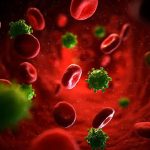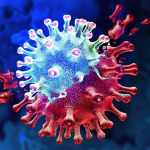The influenza virus infects between 5 to 20 percent of the entire U.S. population annually. Many people are hospitalized, and many more die from flu-related illness.
The early recognition of the symptoms of this virus is essential so that you can begin to attend to yourself. The things you do when flu symptoms first arise can make all the difference in the length of the illness. Waiting for it to pass is quite dangerous. This is especially so for pregnant women, older adults, young children, and people with conditions affecting their immune or respiratory systems.
What are the early symptoms of the flu?
At first, the flu can be easily mistaken for a slight cold because they share many symptoms. However, flu symptoms strike much faster and are more severe. While there are various symptoms, three, in particular, can be easily noticed in adults. They are:
- A scratchy or sore throat: One of the first flu symptoms is an irritated or scratchy throat. This sensation is more noticeable when you try to swallow drinks or foods.
- Body aches/pain: The pain has been described as similar to the one experienced after a vigorous workout session.
- Fatigue: It may strike suddenly leaving one extremely weak and tired.
Other flu symptoms include:
- Headache
- Fever
- Stuffy or runny nose
- Cough
- Diarrhea/Vomiting (this is especially noticeable in children)
- Warm, flushed skin
- Chills
What do you do at the start of these symptoms?
If you are starting to feel the onset of this illness, there are many things you could do to get better quickly. They are:
- Wash your hands often: Washing your hands will decrease the risk of spreading the virus to other people. You could also stock up on hand-sanitizer.
- Get adequate rest: Rest is ultimately the best treatment for the flu. You may need to take a few days off from school or work to give your body the rest it needs.
- Stay hydrated: It is essential to drink plenty of water and other healthy fluids like decaffeinated tea, broth, or diluted juice.
- Eat healthily: You may experience a loss of appetite; however, when you can eat, ensure that you consume foods that can help boost your immunity. You could eat fruit and veggies, yogurt, and soups.
- Purchase pain relievers: OTC pain relievers like ibuprofen and acetaminophen will ease your flu symptoms and give you relief.
- Stay away from caffeine and alcohol: Caffeine and alcohol cause dehydration, which could worsen the symptoms and lengthen the duration of the illness. Therefore, it is best to avoid them until you have fully recovered.
What not to do at the first sign of the flu
- Do not take anti-biotics: A virus, not bacteria is responsible for the flu. Therefore, there is no need for anti-biotics.
- Do not take too many vitamins: If you already take multivitamins daily, there is no need to stop your medication. However, take care not to take too many in a bid to cure your illness.
- Do not smoke: The flu is an illness that affects your respiratory system. Therefore, you should not smoke as it will irritate your lungs and worsen the symptoms.
- Do not overwork yourself: The symptoms of the flu are progressive. This means that they will become worse over time before you start to feel better. Thus, it is essential to get adequate rest to give your body time to recuperate. Overworking yourself would only worsen the illness, and it might take a longer time to recover.
- Do not go to public places: The flu is quite contagious, and you do not want to play a role in spreading it. Therefore, it is best to avoid all social engagements and physical contact with other people, at least for a week.
- Do not load up on junk or processed foods: Ths kind of foods will not supply the nutrients your body needs. So, it is better to avoid them altogether until you have completely recovered.
When should you visit a doctor?
When the symptoms of flu become severe, you may need to see your doctor. Examples of these severe symptoms are chest pain, sudden dizziness, and shortness of breath. Also, if you suffer from a respiratory or immune system condition, you may need to see your doctor. Pregnant women, older adults, and younger children have a high risk of suffering life-threatening complications. Therefore, they need to see the doctor once they notice the early symptoms of the flu.
If your regular hospital is closed for the day, you may require the services of a home doctor. If you live in Brisbane, then House Call Doctor is for you.
In conclusion
The best thing to do once you experience the early symptoms of the flu is to stay at home and rest. This way, you give your body time to recover, and you reduce the risk of spreading the virus.







